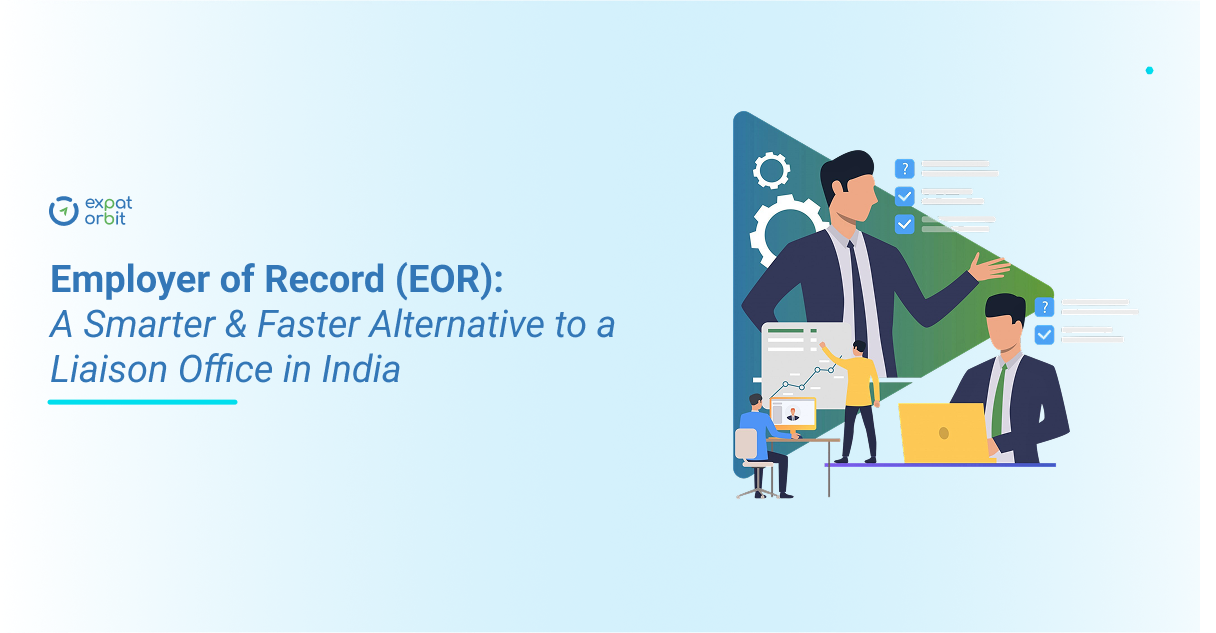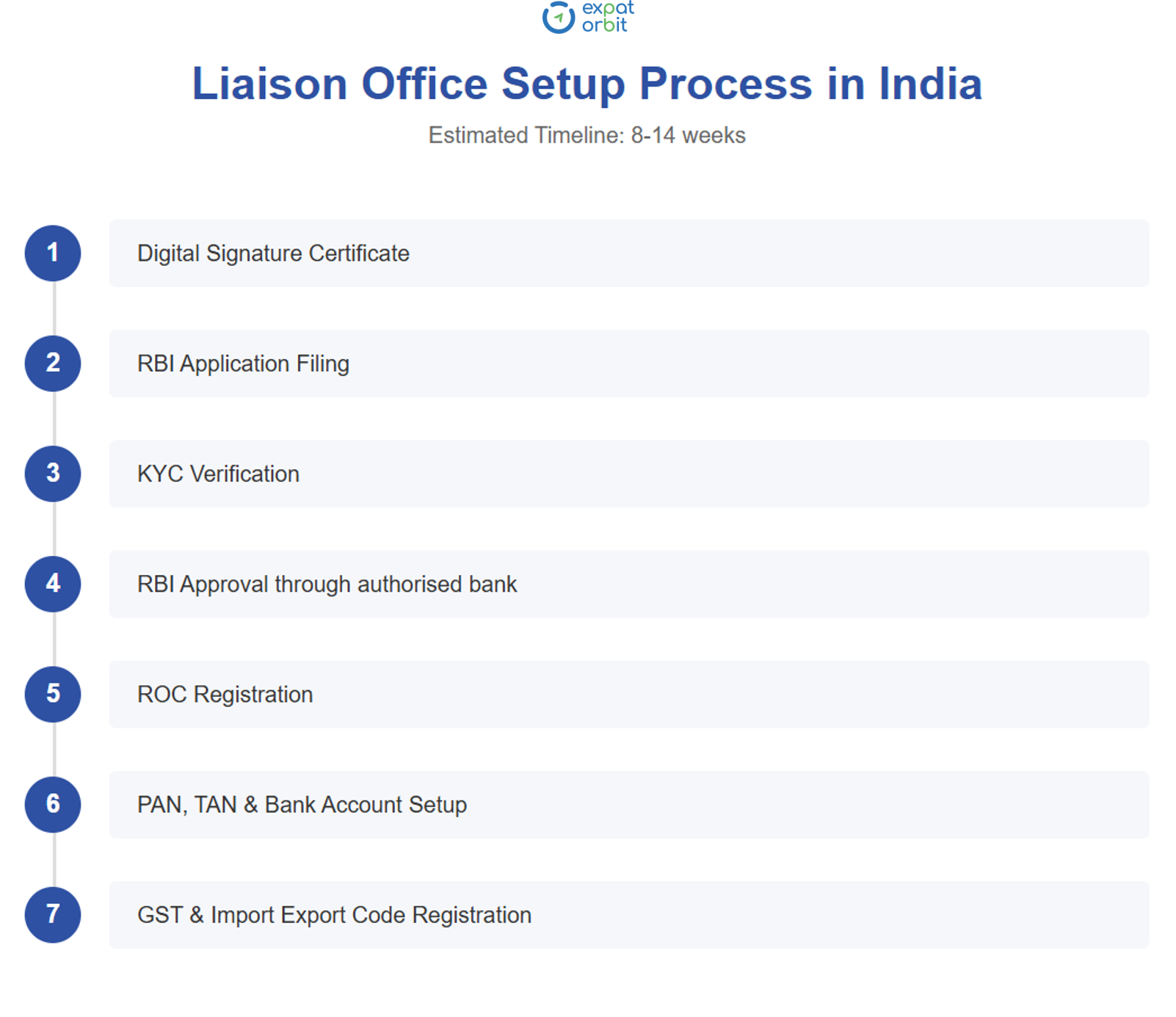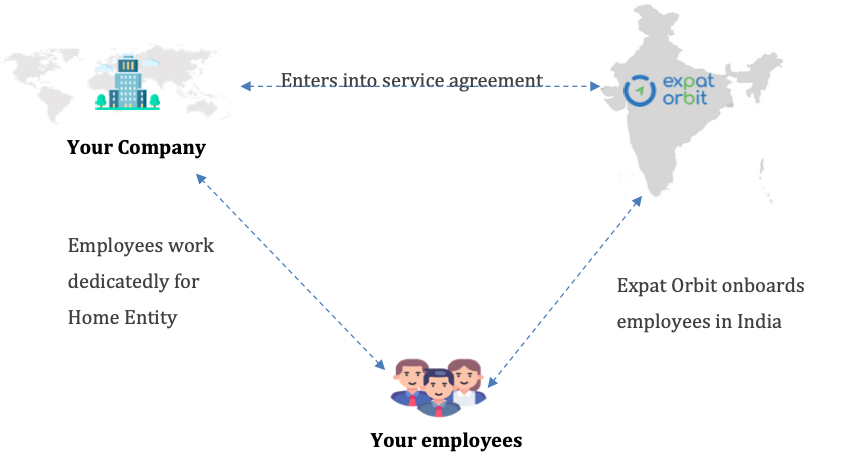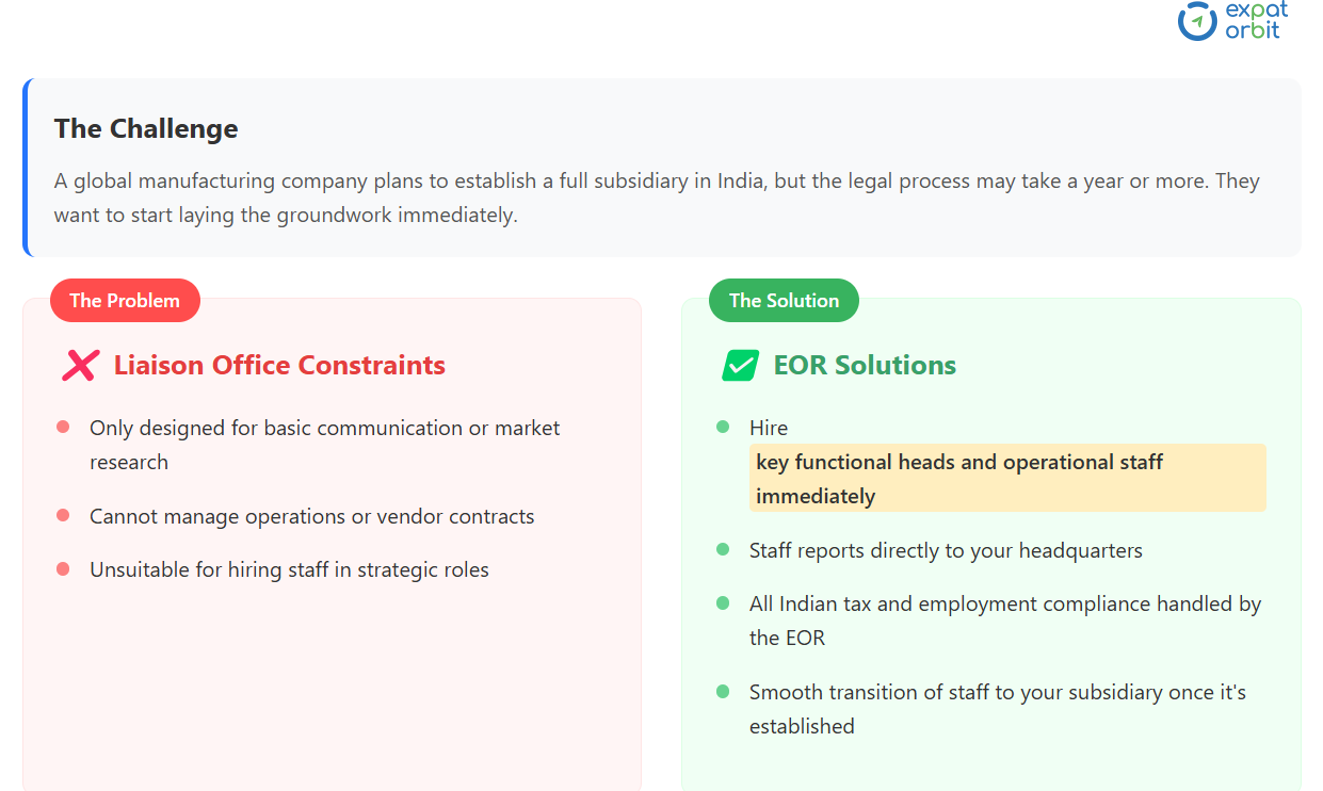Why an Employer of Record (EOR) is a Smarter, Faster Alternative to a Liaison Office in India

India’s growing economy, tech-savvy population, and expanding middle class make it an exciting frontier for global businesses. But entering this dynamic market often involves complex decisions—particularly around how to set up.
Traditionally, foreign businesses dip their toes into India via a liaison office. While it gives you a formal presence, the red tape, compliance headaches, and commercial limitations often outweigh the benefits.
Fortunately, there’s a modern, efficient alternative—Employer of Record (EOR).
Understanding the Liaison Office Setup
A liaison office is a representative office set up by foreign companies to explore Indian markets. It's typically used to:
-
Promote the parent company’s products
-
Conduct market research
-
Act as a communication channel
However, it’s not allowed to engage in commercial activities. That means you can’t invoice customers, earn revenue, or conduct business transactions.
The Setup Process

Setting up a liaison office involves approvals and registrations from the Reserve Bank of India (RBI), tax departments, and other authorities. This makes it less ideal for businesses simply looking to test waters or explore early opportunities.
The Challenge of Entering the Indian Market

When expanding your business into India, a liaison office has traditionally been the first step many companies consider. However, this approach comes with significant drawbacks:
-
Lengthy setup procedures: Establishing a liaison office requires approval from the Reserve Bank of India (RBI), which can take 2–3 months, plus additional time for various registrations with tax authorities and local bodies.
-
Burdensome compliance requirements: Liaison offices must maintain detailed books of accounts, undergo annual audits, file Foreign Liabilities and Assets (FLA) returns, and submit Annual Activity Certificates to the RBI.
-
Severe restrictions on revenue generation: Liaison offices cannot engage in any commercial, trading, or industrial activities, limiting their function to communication channels and market research.
-
Limited operational lifespan: RBI typically grants permission for 2–3 years initially, with extensions requiring fresh applications and approvals.
-
Complex closure process: Winding up a liaison office involves obtaining No Objection Certificates from tax authorities, filing final returns, and closing bank accounts, which can take 6–8 months.
These limitations raise an important question:
Why navigate through legal complexities when you're simply testing a new market?
Imagine a solution that liberates you from this intricate compliance web. One that minimises costs, effort, and time, not just facilitating an initial step but enabling a comprehensive immersion into the Indian business landscape.
What if we tell you, you can escape this complex compliance regime? With less cost, effort, and time, have not just your foot, but almost your whole self inside India’s doors.
Work with an Employer of Record (EOR).
Introducing the Employer of Record Solution
An EOR is a third-party service provider that acts as the legal employer of your employees in a foreign country (India in our case) where you do not have an entity. This solution offers numerous advantages over a liaison office, providing a cost-effective and low-hanging fruit approach to growing your presence in India.
Structure Explained

For instance, you can hire operations and marketing executives in India. Study the customer behavior through them. Tweak your product as per Indian taste. Get the ground ready before establishing a full-fledged entity here. Do not worry about handling employer-related compliances for those operations and marketing reps—taxes, withholding, payroll, et al.—because that’s exactly what the legal employer, aka, EOR is handling for you.
5 Key Advantages of Using an EOR in India
Key Benefits of Choosing an Employer of Record (EOR) Over a Liaison Office in India
Expanding into India doesn't have to be complicated. Choosing an Employer of Record (EOR) can simplify your market entry while reducing both costs and effort. Unlike a liaison office, an EOR provides a full-scale, efficient path to hiring and managing talent in India—without setting up a legal entity. Here are some of the top benefits an EOR arrangement offers:
1. Hassle-Free Setup
One of the biggest advantages of partnering with an EOR is the ease of getting started. Setting up a liaison office in India involves obtaining multiple regulatory approvals, registering with various government authorities, and meeting stringent legal requirements. This process can take several months and demand significant administrative resources.
In contrast, engaging an EOR typically requires nothing more than signing a service agreement. There’s no need to register a business entity, open a bank account, or secure office space. The EOR becomes the legal employer on your behalf, allowing you to hire and onboard talent in a matter of days. This streamlined setup lets you move quickly and focus on your strategic goals.
2. Wider Operational Scope
Liaison offices are strictly limited in their scope—they are not permitted to engage in any commercial, revenue-generating, or business development activities. Their role is confined to market research, brand promotion, and acting as a communication bridge between the foreign parent company and Indian stakeholders.
An EOR arrangement, however, empowers you with far greater flexibility. You can engage Indian professionals in a wide range of functions, such as customer support, marketing, design, development, and more. Whether you're experimenting with a go-to-market strategy, localizing your product, or scaling customer-facing operations, an EOR enables meaningful business activity from day one.
This expanded operational scope allows you to gather deeper insights into the Indian market, fine-tune your offering, and drive real business outcomes—without the limitations of a liaison office setup.
3. Simplified Compliance
Compliance is one of the most daunting aspects of entering a new market. A liaison office must follow strict regulatory requirements, including maintaining books of accounts, appointing auditors, obtaining licenses, and regularly reporting to multiple government bodies such as the Reserve Bank of India (RBI) and Ministry of Corporate Affairs (MCA). Failing to comply can lead to penalties—or worse, forced closure.
With an EOR, compliance becomes someone else's responsibility. The EOR assumes full accountability for employment-related obligations, including:
-
Payroll processing
-
Income tax and social security contributions
-
Employee benefits and insurance
-
Employment contracts and onboarding
-
Ongoing labor law compliance
4. No Time Limit on Operations
Liaison offices typically come with a limited operational timeline—usually 2 to 3 years—after which an extension must be sought. These extensions are not guaranteed and depend on continued regulatory approval, which can be a roadblock to long-term strategic planning.
In contrast, an EOR arrangement is not bound by such time restrictions. Your contract with the EOR can continue for as long as your business needs, providing long-term continuity and flexibility. You can scale up or down based on your business requirements without worrying about license renewals or government-imposed limitations.
This permanence allows you to build deeper roots in the Indian market with confidence, knowing your operations won’t be interrupted by procedural delays or renewal challenges.
5. Easy Exit Strategy
If and when you decide to establish a full-fledged legal entity in India, transitioning out of an EOR is straightforward and efficient. You can terminate the contract through a mutually agreed notice period and transfer employees to your new entity seamlessly.
On the other hand, winding down a liaison office is a much more complex and time-consuming process. It involves notifying and gaining approval from the RBI and other government bodies, submitting closure reports, finalizing tax assessments, and often working with auditors and legal professionals for several months.
The simplicity of exiting an EOR arrangement gives you added flexibility to evolve your business strategy—without getting stuck in bureaucratic red tape.
Final Thoughts
For companies looking to establish a presence in India quickly and efficiently, an Employer of Record (EOR) offers a compelling alternative to setting up a liaison office. From faster setup and wider operational scope to reduced compliance burdens and flexible timelines, an EOR provides the infrastructure you need to hire and manage local talent—without establishing a legal entity.
It’s not just a shortcut; it’s a smart, scalable, and risk-free solution for global businesses aiming to explore or expand in the Indian market.
Use Cases:
Case 1: Test the Market!
For SaaS companies looking to explore India's massive user base

Case 2: Build Local Relationships with Full Flexibility
International brands seeking to engage potential distributors, suppliers, or collaborative partners in India—without forming a local entity right away.

Case 3: Start Operations While You Build Your Entity
For companies planning a full subsidiary but need to start right away

Liaison Office vs EOR

When Should You Choose an EOR Over a Liaison Office?
An Employer of Record is ideal for companies that:
- Are testing the Indian market
- Want fast setup without red tape
- Need short to mid-term local hiring
- Want to avoid complex regulatory exposure
- Seek flexibility in scaling or exiting
If your goal is to learn, adapt, and grow fast, an EOR is the smarter choice.
FAQs: Employer of Record in India
1. What is the legal standing of an EOR in India?
EORs operate legally under Indian labor laws and act as the formal employer on your behalf. They're compliant with all statutory requirements, including PF, ESI, and income tax.
2. Can an EOR hire in any industry?
Yes. EORs can support employees across sectors like IT, SaaS, marketing, consulting, logistics, and more—except where government licenses or sectoral caps apply.
3. Is an EOR suitable for long-term operations?
Absolutely. Many companies use EORs as a permanent employment model or until they are ready to set up a legal entity in India.
4. How fast can I start hiring using an EOR?
Typically within 1-2 weeks. The onboarding process is fast, especially compared to the months-long liaison office setup.
5. Can I switch from an EOR to a local entity later?
Yes. You can transition employees from the EOR to your entity smoothly once you're ready to establish a subsidiary in India.
Ready to Explore the EOR Advantage?
India's unique business environment combines tremendous opportunity with complex regulatory challenges. An Employer of Record solution offers the perfect balance of market access, operational flexibility, and compliance simplicity.
Contact us today to learn how our Employer of Record services can help you successfully navigate your expansion into India with minimal hassle and maximum effectiveness. Our team of experts can provide a customized solution tailored to your specific business needs and growth objectives.
Let us handle the complexities of employment in India while you focus on what matters most—growing your business in one of the world's most promising markets.

